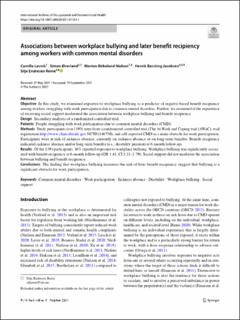Associations between workplace bullying and later beneft recipiency among workers with common mental disorders
Løvvik, Camilla Margrethe Sigvaldsen; Øverland, Simon Nygaard; Nielsen, Morten Birkeland; Jacobsen, Henrik Børsting; Reme, Silje Endresen
Journal article, Peer reviewed
Published version

Åpne
Permanent lenke
https://hdl.handle.net/11250/2975988Utgivelsesdato
2021Metadata
Vis full innførselSamlinger
- Department of Psychosocial Science [862]
- Registrations from Cristin [10402]
Originalversjon
International Archives of Occupational and Environmental Health, 2021. 10.1007/s00420-021-01764-1Sammendrag
Objective
In this study, we examined exposure to workplace bullying as a predictor of registry-based benefit recipiency among workers struggling with work participation due to common mental disorders. Further, we examined if the experience of receiving social support moderated the association between workplace bullying and benefit recipiency.
Design
Secondary analyses of a randomized controlled trial.
Patients
People struggling with work participation due to common mental disorders (CMD).
Methods
Study participants (n = 1193) were from a randomized controlled trial (The At Work and Coping trial (AWaC), trial registration http://www.clinicaltrials.gov NCT01146730), and self-reported CMD as a main obstacle for work participation. Participants were at risk of sickness absence, currently on sickness absence or on long-term benefits. Benefit recipiency indicated sickness absence and/or long-term benefits (i.e., disability pension) at 6-month follow-up.
Results
Of the 1193 participants, 36% reported exposure to workplace bullying. Workplace bullying was significantly associated with benefit recipiency at 6-month follow-up (OR 1.41, CI 1.11–1.79). Social support did not moderate the association between bullying and benefit recipiency.
Conclusions
The finding that workplace bullying increases the risk of later benefit recipiency suggest that bullying is a significant obstacle for work participation.
